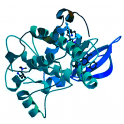
- Remove this product from my favorite's list.
- Add this product to my list of favorites.
Products
Newsletter
 |  |  |  |  |  |

Background: Protein kinase C (PKC) is a family of serine-threonine kinases, which are classified into three major groups: classical (α, β and γ), novel (δ, ε, η, and θ) and atypical (μ, ξ and ι). PKCθ consists of a C-terminal kinase domain and a N-terminal regulatory domain, formed by a C1 domain and a C2-like region. Activation of PKCθ involves recruitment to the membrane and interaction with phospholipids and diacylglycerol. Furthermore, fully active protein results upon phosphorylation of the activation loop. PKCθ is predominantly expressed in hematopoietic cells, especially in T cells, and is involved in signaling pathways associated with T cell development and/or activation. Targets of PKCθ in T cells are e.g. the transcription factors nuclear factor κB (NF-κB) and activator protein-1 (AP-1).
Recombinant human Protein kinase C (PKC) theta, amino acids M1-S706, recombinant and active enzyme, full lenght protein with N-terminal GST-tag, N-terminally fused to GST-FactorXa cleavage site, C-terminally fused to His6
Theoretical MW : 109.677 kDa (fusion proteins)
Expression system: Baculovirus infected Sf9 cells
Purification: One-step affinity purification usingGSH-agarose
Storage buffer: 50 mM Tris-HCl, pH 8.0; 100 mM NaCl, 5 mM DTT, 4 mM reduced glutathione, 20% glycerol
Protein concentration: 0.273 mg/ml (Bradford method using BSA as standard protein)
Method for determination of Km value & specific activity: Filter binding assay MSFC membrane
Specific activity : 166,000 pmol/mg min
Entrez Gene ID: 5588
UniProtKB: Q04759
Ordering information: shipped on dry ice
Altman A, Villalba M. (2002) "Protein kinase C-theta (PKC theta): a key enzyme in T cell life and death." J Biochem.132 (6):841-6.
Baier G, Telford D, Giampa L, Coggeshall KM, Baier-Bitterlich G, Isakov N, Altman A. (1993) "Molecular cloning and characterization of PKC theta, a novel member of the protein kinase C (PKC) gene family expressed predominantly in hematopoietic cells." J Biol Chem. 5; 268 (7): 4997-5004.
Hayashi K, Altman A. (2007) "Protein kinase C theta (PKCtheta): a key player in T cell life and death." Pharmacol Res. 55(6):537-44.
Newton AC (1995) "Protein kinase C: structure, function, and regulation" J Biol Chem. 270(48):28495-8.
Newton AC (1997) "Regulation of protein kinase C" Curr Opin Cell Biol. 9(2):161-7.
Villalba M, Bi K, Hu J, Altman Y, Bushway P, Reits E, Neefjes J, Baier G, Abraham RT, Altman A. (2002) "Translocation of PKC[theta] in T cells is mediated by a nonconventional, PI3-K- and Vav-dependent pathway, but does not absolutely require phospholipase C." J Cell Biol. 15;157(2):253-63.
Altman A, Villalba M. (2003) " Protein kinase C-theta (PKCtheta): it\'s all about location, location, location". Immunol Rev.192:53-63.
Corbalán-García S, Gómez-Fernández JC. (2006) "Protein kinase C regulatory domains: the art of decoding many different signals in membranes." Biochim Biophys Acta. 1761(7):633-54.
Recombinant human Protein Kinase C (PKC) alpha, 10 µg - 465,00 €
PKC substrate, 1mg - 150,00 €
Recombinant human Protein kinase C (PKC) beta 1, 10 µg - 465,00 €
Recombinant human Protein kinase C (PKC) beta 2, 10 µg - 465,00 €
Recombinant human Protein kinase C (PKC) delta, 10 µg - 465,00 €
Welcome Login
Contact us
Follow us